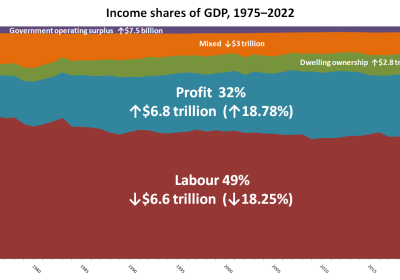Two councils in Queensland have gone to war on homeless people, fining them for having to live in tents in parks. Justin Beevers reports.
Australian Bureau of Statistics (ABS)
Under pressure, Prime Minister Anthony Albanese has backflipped several times on excluding new questions about gender and sexuality in the 2026 Census. The harm this does to LGBTIQ communities should not be discounted, writes Josh Adams.
As the Reserve Bank of Australia and Labor and the Coalition continue to supress wages, living costs continue to rise. Peter Boyle reports.
The big lie at the heart of every budget it that it is a plan to manage the economy for the collective good of the nation, write Peter Boyle and Paul Oboohov.
In the lead-up to the federal Jobs Summit, it is worth remembering that Australia is carrying a burgeoning precariat of unemployed and underemployed people, writes Malcolm King.
A new ACTU report states poor pay, a lack of hours and employer responses to the pandemic are driving insecure work. Paul Oboohov reports.
Nothing maintains the culture wars more than a conservative PM blaming the unemployed for their lack of employment to a room full of rich business people, writes Dechlan Brennan.
The recession, we're told, is over. But, as Graham Matthews details, Australia’s unemployed and underemployed are about to face more pain as the COVID-19 subsidies are withdrawn.
Polls released in the first week of October have shown a surge in support for marriage equality, the result of new Australian Electoral Commission enrolments by young people, women and inner-city residents who are more likely to vote Yes.
So the government is planning a plebiscite on equal marriage by means of post, presumably because it didn’t want to confuse elderly opponents of marriage equality with new-fangled technological developments like the telegram.
The whole project will cost $122 million for a vote that is not even binding, when all polls for years have shown a large majority in favour of marriage equality and the thing could be resolved in a matter of hours by a simple vote in parliament.
Life is about to get a lot tougher for 700,000 workers and their dependents when the penalty rate cuts hit on July 1. It is also the day politicians will get a 2% pay rise.
Full and part-time workers in the retail, fast food, hospitality and pharmacy industries are the first to be hit. The ACTU calculated that casuals in the pharmacy industry will face an annual cut of up to $6000 as the result of a February ruling by the misnamed Fair Work Commission.
- Page 1
- Next page











